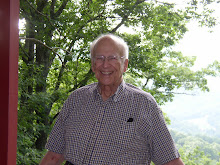A Good Year:
My last year of high school was a good one. My home-room teacher was Mrs. John C. (Esalee) Burdette. At that time my school had only eleven grades.
Unscored on in Football:
Despite my dislike of football, I played for four years and this was my best year. I don't remember having a new uniform anytime, but we didn't complain. The season of 1940 started with a 0-0 tie with Batesburg-Leesville in South Carolina, a team coached by our coach Earl Carson's brother. After a few games without points being scored against us, we got a little nervous. After the tenth game we had scored 269 points to none for the opponents. Not counting the seventh graders we had about 15 players. Since we played both offense and defense, our games were not easy.
No basketball:
I left off basketball entirely. I did think at one point in 1937 that I should at least try, so I went to practice one afternoon. (Later, in the army I played a few games in combat boots.)
No baseball:
I don't know exactly why, but our school never played baseball while I was there. We played baseball in the third grade but that was all.
Enjoyed track:
I was never really good at track, but I enjoyed it. Our own running track was of loose dirt and was terrible. It had been built as a half-mile automobile track. I enjoyed the short dashes and by the fourth year I was fairly good at the 220-yard dash. In what must have been a district meet we ran on a cinder track at the University of Georgia, and I managed to place third. That was good for me.
Frequent class officer:
For some reason I was frequently elected a class officer. The last year I was vice-president with Lelia Cheney as president.
Editor of The Blue and Gold:
In high school I could write well and was appointed editor of The Blue and Gold, the school newspaper. It wasn't a real newspaper, just a section ofThe News-Reporter, the local weekly newspaper. I wrote occasional editorials.
Succeeded in the District Literary Meet:
Literary meets provide competition in academic subjects. The disrict literary meet seemed to be limited to seniors, but maybe not. At any rate, I was chosen to enter "Boys' Essay" in the 1941 Disrict Meet in Evans, Columbia County. In those days we didn't have television, but short subjects at the movies took its place. The meet was to be on Saturday and on Friday night I went to a movie and saw a short subject with journalists discussing the question "Should we have reciprocal trade agreements?" Dorothy Thompson was on the panel. That was the question to be answered on the essay I was to write and I won first place.
Supporting Role in Senior Play:
I don't remember much about our senior play except that I was the butler, Reunette Bennett was the maid, and Hirsch Wengrow was in it.
My last year of high school was a good one. My home-room teacher was Mrs. John C. (Esalee) Burdette. At that time my school had only eleven grades.
Unscored on in Football:
Despite my dislike of football, I played for four years and this was my best year. I don't remember having a new uniform anytime, but we didn't complain. The season of 1940 started with a 0-0 tie with Batesburg-Leesville in South Carolina, a team coached by our coach Earl Carson's brother. After a few games without points being scored against us, we got a little nervous. After the tenth game we had scored 269 points to none for the opponents. Not counting the seventh graders we had about 15 players. Since we played both offense and defense, our games were not easy.
No basketball:
I left off basketball entirely. I did think at one point in 1937 that I should at least try, so I went to practice one afternoon. (Later, in the army I played a few games in combat boots.)
No baseball:
I don't know exactly why, but our school never played baseball while I was there. We played baseball in the third grade but that was all.
Enjoyed track:
I was never really good at track, but I enjoyed it. Our own running track was of loose dirt and was terrible. It had been built as a half-mile automobile track. I enjoyed the short dashes and by the fourth year I was fairly good at the 220-yard dash. In what must have been a district meet we ran on a cinder track at the University of Georgia, and I managed to place third. That was good for me.
Frequent class officer:
For some reason I was frequently elected a class officer. The last year I was vice-president with Lelia Cheney as president.
Editor of The Blue and Gold:
In high school I could write well and was appointed editor of The Blue and Gold, the school newspaper. It wasn't a real newspaper, just a section ofThe News-Reporter, the local weekly newspaper. I wrote occasional editorials.
Succeeded in the District Literary Meet:
Literary meets provide competition in academic subjects. The disrict literary meet seemed to be limited to seniors, but maybe not. At any rate, I was chosen to enter "Boys' Essay" in the 1941 Disrict Meet in Evans, Columbia County. In those days we didn't have television, but short subjects at the movies took its place. The meet was to be on Saturday and on Friday night I went to a movie and saw a short subject with journalists discussing the question "Should we have reciprocal trade agreements?" Dorothy Thompson was on the panel. That was the question to be answered on the essay I was to write and I won first place.
Supporting Role in Senior Play:
I don't remember much about our senior play except that I was the butler, Reunette Bennett was the maid, and Hirsch Wengrow was in it.
